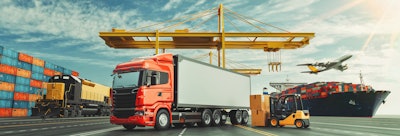
In the complex and fast-paced world of logistics, where shipments change hands multiple times and can encounter many challenging situations, the risks are real and so are the potential losses. Comprehensive cargo insurance is an important financial security blanket that offers essential protection for shippers, consignees and freight forwarders alike. Today, as we see an increase in global shipping challenges, mitigating risk has become increasingly important.
What can go wrong? Cargo can be exposed to unpredictable weather, temperature extremes and mishandling. Improper lashing and stuffing of a container during loading and unloading can result in cargo being damaged. The misdeclaration of dangerous goods has historically resulted in a number of maritime disasters, such as fires, which present a significant danger for all cargo and crew on a vessel. From water damage and physical harm to contamination, infestation and extreme temperature fluctuations – the threats are diverse, and so should be the protection.
That's where cargo insurance comes in. It's more than a safety net; it's peace of mind for shippers and their logistics partners who entrust their valuable cargo to the intricate web of global logistics. If cargo is lost or damaged during transit, the policyholder can file a claim to receive compensation for their losses or damages.
In March 2018, the Maersk Honam container ship experienced a severe fire while transiting the Arabian Sea. The fire led to the ship's captain deliberately sending containers overboard to prevent the spread of the fire and to stabilize the vessel. As a result, a General Average was declared. General Average is when all sea freight stakeholders equally share any damage or losses that may occur as a result of voluntary vessel or cargo sacrifices to save the whole in an emergency, such as fires, jettison, ship grounding, and collisions. For the Maersk Honam, all stakeholders including cargo owners, shared in the financial losses of the sacrificed cargo and other relevant expenses.
The World Shipping Council has indicated that the proper packing, stowage and securing of containers, and reporting of correct weight are key to the safety of a container ship, its crew, and its cargo, to shore-based workers, and to the environment. The responsibility for container safety is shared across the supply chain, and everyday liner carriers work with their partners to prevent incidents and ensure safe container transport. With 2022 container cargo transported valued at more than $7 trillion ongoing safety measures and insurance protection is vital.
Types of Cargo Insurance:
All Risk- cargo insurance provides the broadest coverage offering a wide range of protection for a variety of external factors including, accidental damage, theft and loss. It offers the most complete blanket of coverage of your freight in transit. There are exclusions, such as earthquakes, war, plus more, which should be clearly identified in a policy.
Free of Particular Average- (FPA) cargo insurance is more specific as compared to All Risk. FPA insurance covers damage or loss when it reaches a certain level, typically a higher threshold than what might be considered minor. It addresses significant events, such as natural disasters, that result in significant damage or loss.
Navigating cargo insurance types for shippers, consignees and freight forwarders- Cargo insurance plays a fundamental role in logistics operations, providing essential protection and peace of mind for shippers, consignees, and freight forwarders alike.
Shippers- Cargo insurance is like a safety net that protects freight in transit from loss or damage. Imagine if goods are damaged, lost or stolen during a particular journey. Without insurance, shippers could lose a great deal of money. Cargo insurance makes sure that if something goes wrong, shippers won't have to bear the full financial burden. It lets them ship with confidence, knowing their items are covered.
Consignees- Consignees benefit from cargo insurance in cases where shipments arrive in bad condition, or not at all, due to accidents or other disastrous events during transport. Cargo insurance helps consignees get compensated for their losses. This is important because they rely on these goods for their businesses or personal needs.
Freight Forwarders- Freight forwarders are like travel agents for shipping. They handle the logistics of getting goods from point A to point B. As intermediaries between shippers and carriers, freight forwarders play a critical role in the shipping process and, depending on the contractual terms, may be held liable for any loss or damage to cargo that occurs during the shipping process. Without cargo insurance, freight forwarders can, in fact, find themselves financially responsible. Insurance helps them avoid financial trouble if accidents, delays, or other problems occur. Insurance provides a layer of protection for their valued customers’ cargo.
Cargo insurance can also provide an additional revenue stream for freight forwarders as a margin can be added when offering coverage to clients.
Streamline freight management- Forwarders supporting their customers with a freight technology platform effectively streamline the complexities of freight documentation and management. Automated, integrated solutions seamlessly combine shipment data, such as transportation and distribution costs and bookings, as well as the cargo insurance coverage details for each shipment. This provides a systematized record offering total visibility into the costs of all aspects of the freight transaction, including the insurance.
Property and casualty insurance is another type of coverage forwarders should consider to protect their business operations for cases that involve errors and omissions, liability, or commercial automotive and property events. While Property and Casualty insurance is relevant for freight forwarders businesses it is also a form of insurance that applies to other service businesses, such as lawyers and retailers.
Cargo insurance is like a safety shield protecting the many stakeholders involved in shipping. It ensures that, although many things can still go awry with a shipment, shippers, forwarders and consignees won't be left dealing with big financial headaches in the aftermath of an incident.













![Pros To Know 2026 [color]](https://img.sdcexec.com/mindful/acbm/workspaces/default/uploads/2025/08/prostoknow-2026-color.mduFvhpgMk.png?ar=16%3A9&auto=format%2Ccompress&bg=fff&fill-color=fff&fit=fill&h=135&q=70&w=240)



